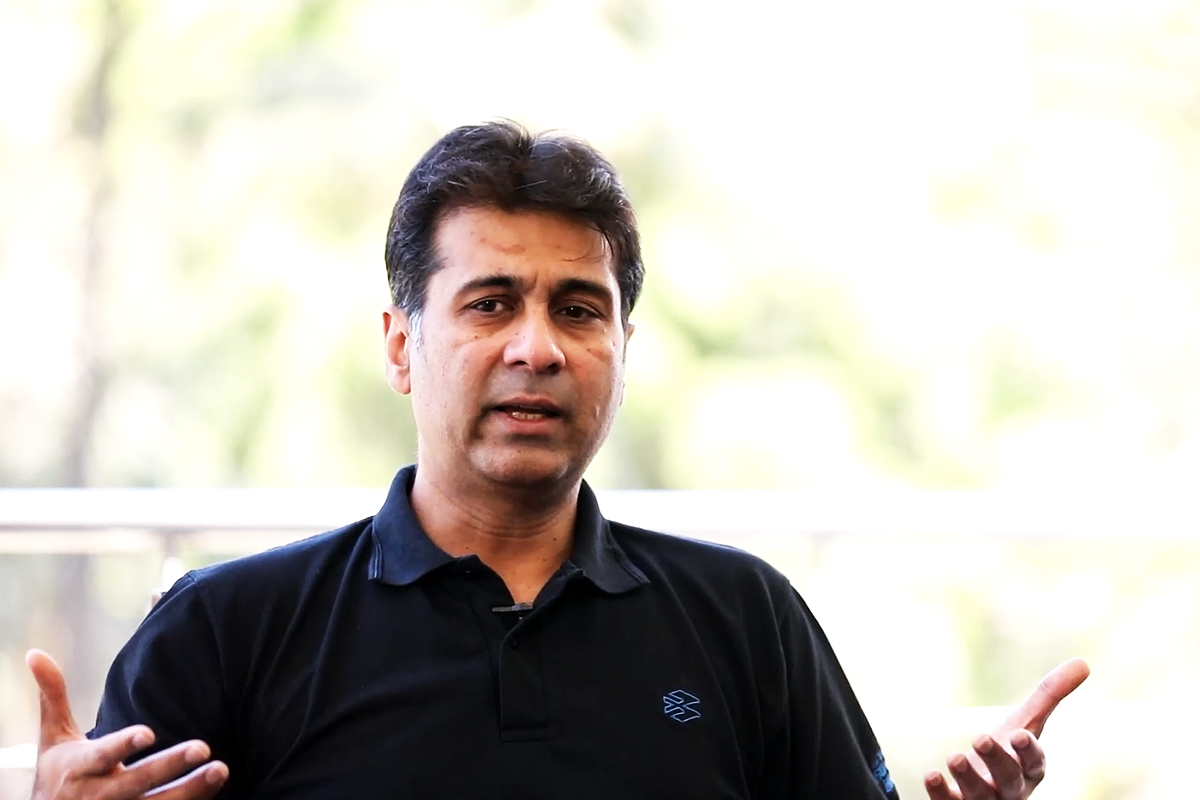The Thackeray intervention
When the labour dispute happened, the remarkable thing was that it had to be sorted out in the chambers of Bal Thackeray. I remember going there and our workmen and union people waiting outside.
Apparently, when Thackeray had come to Mumbai, he was a ‘nobody’ and my grand uncle, Ramkrishnaji, had taken a liking to him and his cartoons, and he had sort of supported him. So, Thackeray had great regard for him and, therefore, for the family. It was very clear that he was not going to be rough with us. At the same time, it was his union and he was obviously the big boss in the room that day, not dad. It was his call to take. It was good training for me, to see the dynamics playing out, because I had asked myself what I would have done in such a situation. I did not want to concede because my people and my supervisors had been beaten up and there had been violence. So, people had to lose their jobs. There was one particularly troublesome character and, at the time, my attitude, as my younger self, was that he should be sacked. He should be punished. I insisted that we should not go back on that. Dad was having a hard time, too. He tried to tell the union leaders that this time, Rajiv has also dug his heels, but the union was not going to allow anyone’s sacking. It was a stalemate and that’s why we had to go to the power centre.
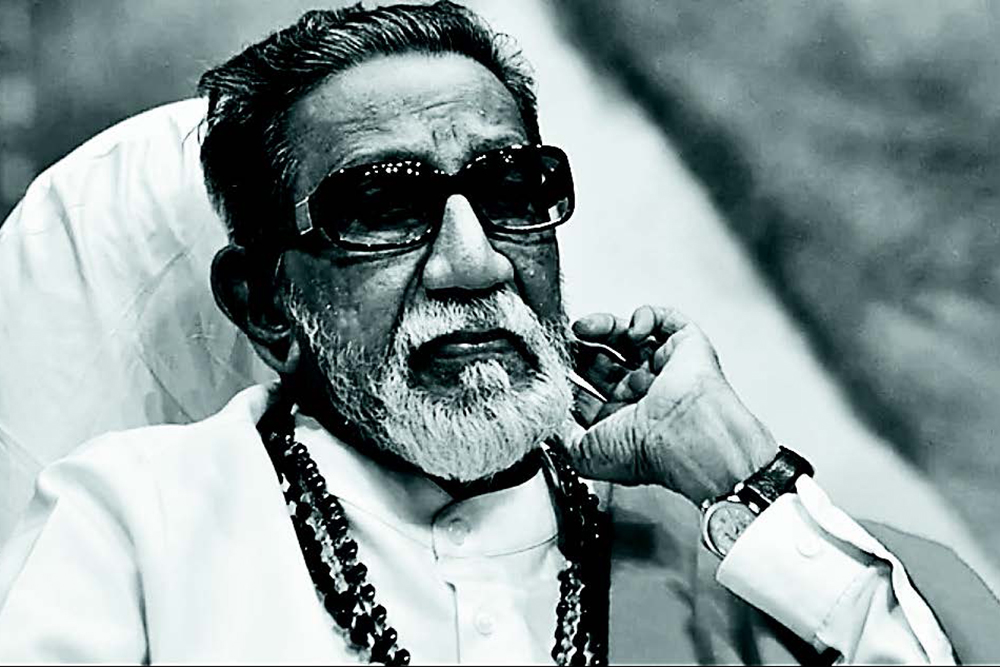 I asked myself what dad would do if Thackeray said ‘No’. That would be the end of it. Dad was clever. He briefed Thackeray about what had happened and then handed over a set of keys to him, saying, “These are the keys to the gate, and I am giving it to you. You manage the company now because I can’t do it. I am caught between the devil and the deep blue sea. My son won’t relent and your fellows won’t listen. So, chaabi aap rakh lo.”
I asked myself what dad would do if Thackeray said ‘No’. That would be the end of it. Dad was clever. He briefed Thackeray about what had happened and then handed over a set of keys to him, saying, “These are the keys to the gate, and I am giving it to you. You manage the company now because I can’t do it. I am caught between the devil and the deep blue sea. My son won’t relent and your fellows won’t listen. So, chaabi aap rakh lo.”
Thackeray changed the subject by saying, “Aap stress mat lo, beer lenge kya?” I was quite surprised since it was the middle of the day! Dad generally doesn’t drink at all, certainly not during the day. He declined. To that, Thackeray said, “Aap beer nahi peete? Isliye aapko life mein itna tension hai. Phir health problem bhi hoga baad mein. Beer peena zaroori hai, sab problems solve ho jaate hai.” He lightened the mood.
He gestured to some of his people in the room, some of whom are ministers now. He asked them if the person had done what I was saying, if he had really beaten up the other man and was a repeat offender. When they said ‘yes’, he said, “Kadun taaka tyala.” They were all shocked. This decisiveness, I liked. It suited me, of course. But, even otherwise. Today’s politicians are not decisive and that is why we have ended up with some of the people that we have. You need to be decisive, and cannot have one person usurp the discipline of the party. Here was a leader who was fair and open. He gave time and invited feedback, and then was able to stand up and do the right thing, and yet, he did that with a velvet glove. He asked us to give the man, who would be sacked, an autorickshaw free of cost. With an autorickshaw, the man could start earning the next day, his family would not suffer, and the matter was closed.
This was a big lesson for me, on how this solution was plucked out. It was so counterintuitive, so unusual. The way dad made his case clear with absolute respect in front of a fellow who everybody feared, and yet, how that person lightened the situation and brought everyone around to the correct decision. It was remarkable.
It was street-smart, tactful. When we came out of the house, people were garlanding dad’s car, offering ladoos and bursting crackers. The great Indian tamasha.
On happiness and silence
Abhinav Bindra, who is like a younger brother to me, recommended a video called Nothing Can Make You Happy by Rupert Spira. He says, fundamentally, happiness is a constant. As a child, if you get a toy, you are happy; when you grow up and you buy a house, you are happy. He says the happiness that you experience in both those instances, with a toy or a house, is the same. It is not qualitatively or quantitatively different. Secondly, he says that happiness is like the blue sky that is always there. It is you who are handing over your happiness to the clouds.
The third thing I remember him saying is that if you are still not convinced, think of the things that make you unhappy. Ask yourself if the situation is really so unbearable. Then, ask yourself if it is the situation that is unbearable or if it is your resistance to the situation. It is because you are resisting that you allow yourself to be sucked into the clouds.
That is when silence, quietness or stillness become important. Mom had this quality. You have to consciously make an effort to not react and let the cloud pass. It is easy with the small stuff, but not with the bigger stuff like a stressful business environment or if someone is unwell.
I used to tell Abhinav, “Yaar, tu kuch bolta hi nahi hai!” to which he would tell me that being social — making friends or going to a party or having conversations — were difficult for him because his whole life has always been about being quiet. If you read his book, A Shot at History, about winning the gold at the Olympics, he describes in great detail what goes into being so still that you can shoot at the centre of that tiny dot 10 metres away.
I admire him. I cannot even take a motorcycle apart and put it together, but Abhinav can take his gun apart to the last spring and put it together. That is why I sent Rishab to him as there is no better mentor for him.
His is also one kind of silence. I found that in all great people, right from Guruji BKS Iyengar, who, at the age of 75, could sit in an asana for hours while I won’t be able to sit in it for two minutes. How do you keep your mind still and not feel the pain? It is a powerful stillness and quietness.
Yoga centres self
It was July 2012 and I was doing yoga in Delhi. The room was too cold from the air-conditioner and my body was stiffer in the morning. I was doing extreme backbends and, at one point, when I was halfway into a posture, I got stuck. I could neither go down nor come up. It caused severe damage to my spinal disc and was quite painful. I couldn’t even sit still. I went to the orthopedic surgeon who did an MRI and said that I had been lucky, it could have been worse. I still had to be in bed for three weeks and I was happy to stay in bed, not one to be too particular about coming to the office and all of that… but, the problem was that the pain was relentless. I could not even stand under the shower for two minutes. I was in pain 24/7. I was on a homeopathic treatment so I didn’t take allopathic medicines, but I took every conceivable painkiller. None of them had any impact.
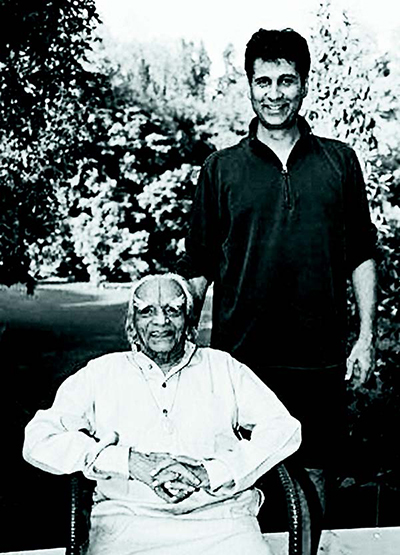 Then, Guruji called me. He had spoken to my yoga teacher, who was his student, and had come to know I wasn’t well. He asked me to see him and said that he would fix me. I had no intention of going because he was a taskmaster. Even during a normal class, he wrings the life out of me and in my condition, I could not even lie down without pain. About three weeks passed and he phoned again and said, “Please come, while the wound is still fresh, I won’t be able to help afterwards.” I went and it was a task, getting into the car and climbing a flight of stairs. I said to Guruji, “Please be gentle.” To which, Guruji said, “See, I focus only on the pain, not on the person.” That was a lesson in itself.
Then, Guruji called me. He had spoken to my yoga teacher, who was his student, and had come to know I wasn’t well. He asked me to see him and said that he would fix me. I had no intention of going because he was a taskmaster. Even during a normal class, he wrings the life out of me and in my condition, I could not even lie down without pain. About three weeks passed and he phoned again and said, “Please come, while the wound is still fresh, I won’t be able to help afterwards.” I went and it was a task, getting into the car and climbing a flight of stairs. I said to Guruji, “Please be gentle.” To which, Guruji said, “See, I focus only on the pain, not on the person.” That was a lesson in itself.
Then, he sat me near a window, righted my posture and asked me to hold the window grill and twist. I never imagined I could do it, but I could, and I felt no pain. He then said, the first problem, whether it is in yoga or life or work, is direction. That if my direction is wrong, everything will hurt me and if my direction is right, nothing will.
Then, Guruji made me do the Sirsasana and asked me to be aware about the perfect alignment of the ear, the hip and the ankle. Then, over my left foot, which was the bad one, he hung a 5-kg weight and asked me to push against it. If somebody had told me that day that I was going to do a headstand and lift a weight while doing it, I would have said it was impossible. But here I was, and there was no pain.
Guruji then said that the most important thing in yoga or at work, once the direction is right, is alignment. At work, alignment of one department with the other, one person with the other, the whole supply chain… if you are all aligned in the same direction, then there is no problem. But, my problem while doing yoga was that I was doing it with ego… to show how much I could bend and twist. Therefore, I was getting the direction and alignment wrong only to impress people who were watching me.
After making me do yoga for two hours, he finally made me do the shoulder stand. He said, “First you take a position, then find your centre in that position.” The centre is where you feel nothing. You have to keep adjusting your posture till you feel nothing… that is your centre. From that centre, you can move your arms and legs about and splay your legs to the side without any trouble, provided you are on your centre. If not, you will fall down.
It is a lesson for work and life as well. Find that centre and never leave it. Whatever you do, whether it is to make an electric Chetak or a KTM, make it from that centre. If you lose that centre, it is like crossing a Lakshman Rekha. Some Ravana can come and take you away to another place. After two hours of yoga that day, I felt my body, which had felt like it was in pieces earlier, welded into a whole. I walked down and drove home effortlessly.
Later, when I told Guruji that my doctor had advised pinhole surgery to fix me and asked how he managed 30% recovery without any of that, he told me there are two schools of thought. The western belief is that function follows structure — that is, fixing your structure will help you start functioning correctly. But he believed structure follows function — that once you start functioning slowly, in the correct manner, keeping the correct direction and alignment, the structure will right itself. This episode with yoga taught me so much about how to deal with work, alignment, centre, expansion and growth.
My holy grail
My ambition has changed over time. Some I have managed to do, some I have not. I have come to realise that my ultimate ambition is to become nothing, because that is the most difficult thing. It is like silence. Jiddu Krishnamurti once said, “The minute you want to become something, you are no longer free.”
I have observed people like Narayana Murthy, dad and Ratan Tata, who are more or less of the same age. Dad and Ratan Tata were in the same class. So, when they were 50, they used to say that at 60, they would retire, and the young crop should take over. While some people have retired, most others conveniently made the retirement age 65 and then 70. I have realised that people don’t want to let go, they want something more, to become something more. I have wondered when I would retire, when I would stop becoming somebody. I posed this question to Dr. Rajan and he said the only thing we need to retire is our ego. That is all. I have not been successful at that and I will keep trying to do that.
I have told my colleagues that 90% of what they can do, I cannot do. So, there was no point in me coming to the office every day and sitting on their heads. We work five days a week now and I go to the office for not more than two days a week. My goal is to make it zero. But that doesn’t mean that I have retired because I get paid a big salary. There is no question of retiring and giving that up. But am I going to come to work, put my car on the road, contribute to greenhouse gas emissions, cause congestion to make my presence felt and waste people’s time just because I am the MD who is supposed to know everything? I am not going to do that either. I sit at home in my garden with my dogs and work from there.
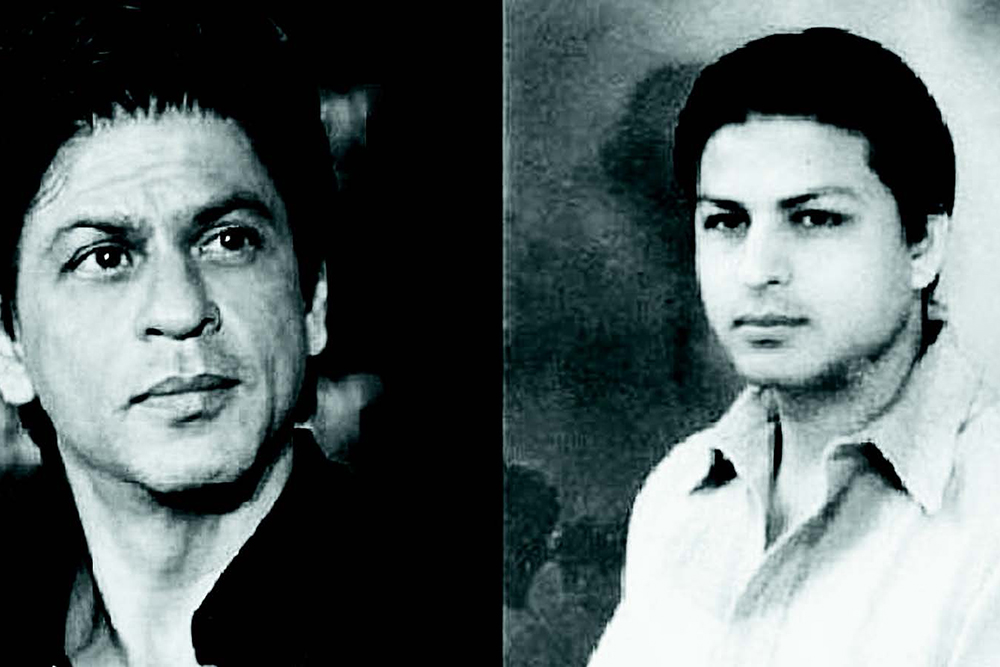
I have seen my grandfather do this. He was an entrepreneur who took risks and put money into new things. This company was started by him and not by my dad. My memory of him is a wooden bed with an incline, and he sitting on it under the sun, getting an oil massage and conducting his work from there.
My goal, over the past few years, has been to intervene minimally, to let people do their work and, of course, I have my own way of knowing what is happening, but do less and less.
There is a quote by a person whose name I cannot pronounce (Lao Tzu). He said ‘Less and less is done, until nonaction is achieved. When nothing is done, nothing is left undone’. Even in a yoga asana, it is like that. To perfect your forward bend, to touch your head to your knees, you have to stop struggling. You have to give in, exhale, be humble and only then can you do it. An egoistic person can never touch his head to his knees.
A simpler version of this truth was told to me by Shahrukh. We were sitting in his house one day and chatting, and I noticed a black and white photo of his father. He told me that one of the greatest lessons his father had taught him was ‘Jo kuch nahi karte, woh kamaal karte hain’. I did not understand it then. I thought, as usual, Mr. Bollywood was being oversmart, but later I realised there were people who can make things happen even when they look like they are doing nothing.
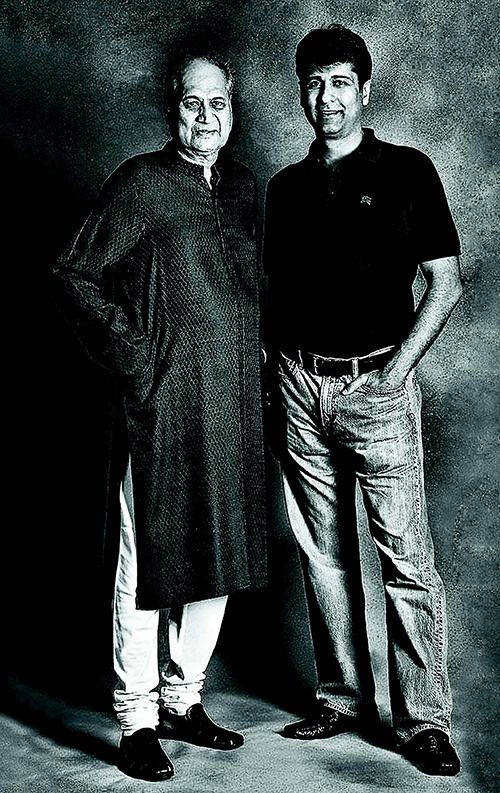 A father-son moment
A father-son moment
In 2004, mom underwent a bypass surgery at Cleveland Clinic. She was strong and went into it as if she was going to get her nails clipped but we were all scared. Dad is one of those people who are tough on the outside but soft inside. So, while he kept his composure, he was shattered.
She recovered well but dad had been internalising an enormous amount of stress over the seven months before the procedure. After she was moved to a regular room, I was to fly back. I met her and hugged her, and all was fine. I said my goodbye to her and left her room. My aunt and dad were there, too. This was 2004 and the business-related father-son war was at its peak. I felt I should say goodbye to him as well and not just walk away because it was not like we were not talking to each other at all.
I turned around to say goodbye to him, and he came and hugged me. He kept his head on my shoulder and cried and cried. He is a little shorter than I am, so his head was on my shoulder the whole time. Sometimes, they say, you see the parent as a child. That’s when I experienced it. It was a different experience.
Watch the video here.




